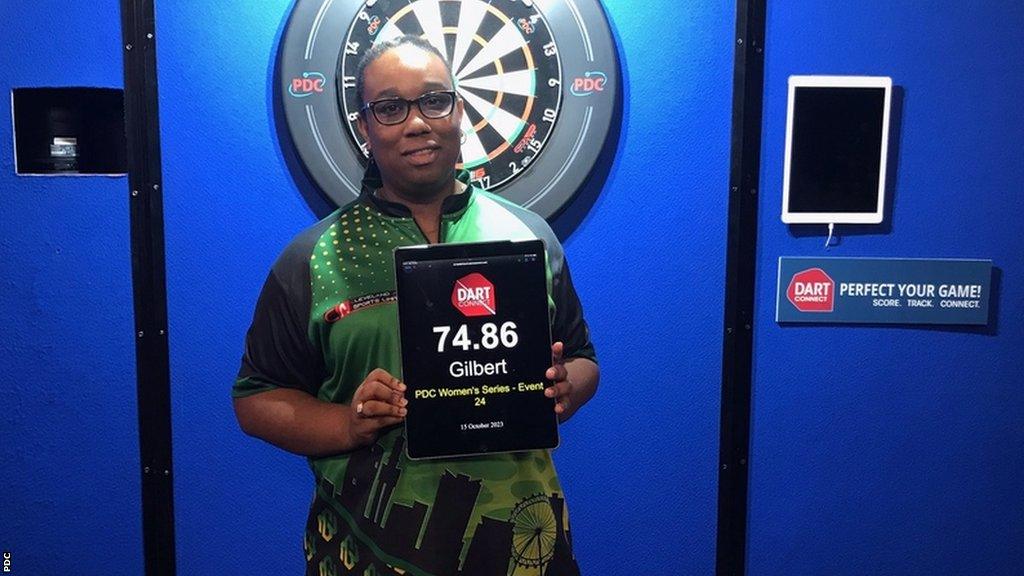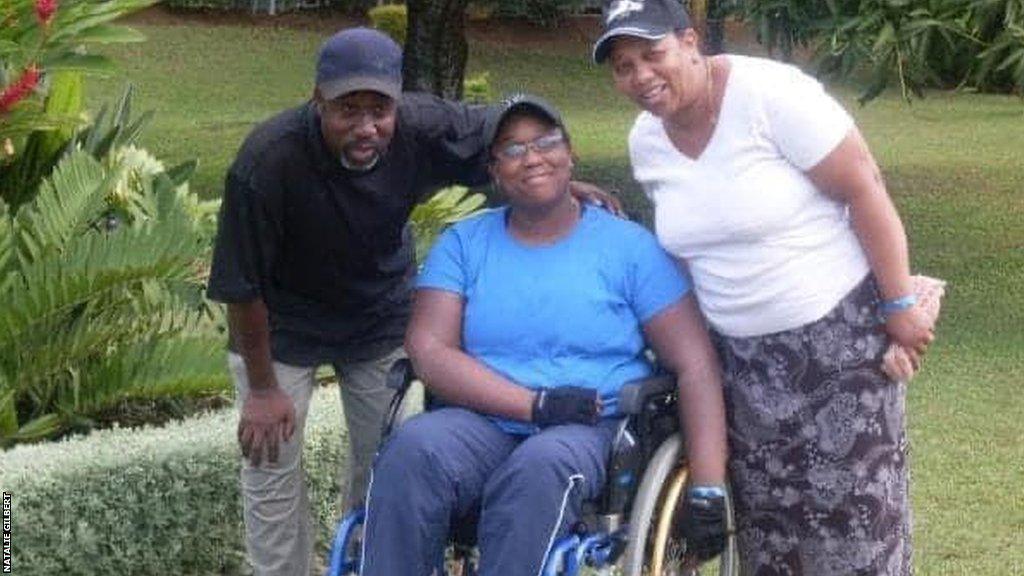Natalie Gilbert on journey from stroke at 25 to darts champion at 40
- Published

Natalie Gilbert was 25 when she suffered a stroke - now 40, she recently won her first major PDC darts title
When Walsall Ladies footballer Natalie Gilbert had a stroke at the age of 25, it left her "like a baby again".
Unable to speak and numb on her left side, Gilbert says she didn't always believe she would get better.
But better she got - and had it not been for the stroke, she may never have picked up a dart.
Now 40, Gilbert's adult life has been dominated by two fateful nights - one that ended in hospital, and one that ended with her discovering a previously dormant natural talent.
And she's made sure it was the latter, not the former, that has defined it.
'Like a baby again'
Gilbert's life was "normal" before the evening in 2008 that would turn her world upside down.
A healthcare assistant at Good Hope Hospital in Sutton Coldfield, near Birmingham, her sport was football.
But on a night out with a friend she became unwell - "the room was spinning, but I'd hardly drank anything" - so they went home.
"My next memory is waking up in A&E," says Gilbert. "She had put me to sleep on her sofa, came down later and found me fitting on the floor.
"They said it was only a small area [of the brain affected] but the damage it caused was quite severe. I was like a baby again - I didn't speak, swallow, sit up, my left side was completely numb."
Strokes in people under 30 are not common but there are more than 1,000 annually in the UK on average.
The cause in Gilbert's case? High blood pressure possibly, or perhaps a previous skin infection that could have spread to the brain. But health professionals also pointed to lifestyle - not bad habits, but overdoing it and not sleeping enough.
"I used to work six nights," says Gilbert. "You're young and you like the money, don't you? So I did burn the candle at both ends.
"I would work, go straight to football, sometimes go home, nap and go back to work that night. I didn't have much else to do and there's always something to save for."
From outpatient to the oche
Rehabilitation and darts are not words you would necessarily expect in the same sentence. Gilbert certainly didn't - and first came months of recovery that turned into years.
"My speech was slurry once it started to come through but mobility was the hard thing to get back," she says.
"The swallowing took its time but being able to eat pureed foods was better than having to be fed by the tube. I was choking on my own phlegm - it wasn't nice."
Gilbert was in and out of hospital for months, partly because of migraines that mimicked the stroke.
"To go from being a mobile 25-year-old to one that sits and looks at the same four walls isn't easy," she says.
"It wasn't a nice time and I didn't always believe I was going to get better."
But, gradually, she did - her recovery aided by mum Marie, dad Lincoln and brother Daniel.
The wheelchair was switched for a Zimmer frame, then for crutches. Then, while playing poker in a local pub, she picked up some darts. And it was clear she had a talent.
It wasn't easy, of course, but little was then.
"I'd sit down in between throws," she says. "Someone else retrieved my darts. You talk about goals - I just wanted to play and be able to collect my own darts."
Medics gave her the thumbs-up - it helped her rehab, improving her balance instead of "doing everything leaning towards my good side".
It had taken her seven years to reach something approaching her pre-stroke physical self - but the darting progress came much quicker.
Pub team to regional level to county to representing England - then, in 2019, a high she could never have imagined.

Natalie (centre) with dad Lincoln and mum Marie
Within touching distance of Ally Pally
That was the year Fallon Sherrock became a household name as the first woman to win a match at the PDC World Championship.
Sherrock secured her place in the biggest tournament in darts through the women's qualifiers - and Gilbert was the player she beat in the final.
"I was really surprised to get there, especially looking at the route I had," says Gilbert, from Tamworth.
"They were all good ladies who'd been playing longer than me. I was happy to get there and there was no disgrace in losing. But that was the start of wanting to push myself to see if I could fit in among them all."
And she has. Like her physical recovery, the improvements have been gradual but noticeable.
"I played an awful lot in lockdown," she says. "Just that regular practice... I noticed a lift in my standard."
Once normality resumed, last-32s became last-16s, then quarter-finals, then semis, then finals.
Then, in October, she lifted her first major title - beating Lorraine Winstanley to win the final PDC Women's Series event of 2023.
"To win one that was massive," she says. "I'm hitting every emotion... it all just came flooding out."
The next aim? The Women's World Matchplay in Blackpool, which features the top eight in the rankings. Gilbert is currently seventh.
Then the WDF Women's World Championship, which she came within a dart of qualifying for this year.
"When I first started doing the circuit and travelling, that was my end goal," she says.
'I used to be embarrassed by it'
Gilbert has a daughter, Mya, who is eight.
Pregnancy meant the wheelchair returned - "I couldn't cope with the weight, my balance was terrible" - but six weeks after Mya was born, her mum won a regional tournament having not played in months.
She has learned to cope with whatever life after a stroke throws at her.
"I used to be embarrassed by it - but now I just see it as part of my journey," she says.
"All these years on, I still have issues, pains, reduced function... I don't believe they will ever be 100%.
"What seems like walking around a lot for me is probably just a short walk for someone else. A day at the darts writes me off for a few days.
"But I'm a lot better than many people thought I would be - unless I tell people, they don't know it's happened. I've obviously recovered to a point my problems aren't massively noticeable."